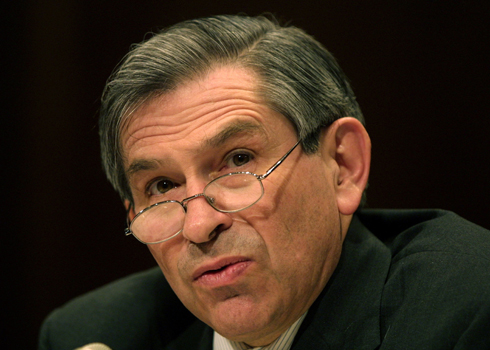Few would have bet, back in late 2007, that by 2011 Barack Obama would make common cause with key architects and supporters of the Iraq war — including Hillary Clinton adviser Michael O’Hanlon, and Paul Wolfowitz, a neocon godfather who needs no introduction — over a regime change mission in another Muslim country.
The odds on that bet would have been somewhere between a lightning strike, and picking a winning bracket in this year’s college basketball tournament.
But less than four years later, those counter-intuitive few would be poised for a hefty payoff.
At a forum on Libya hosted Monday by the hawkish American Enterprise Institute, a bipartisan panel of high-profile pro-war intellectuals applauded Obama’s actions thus far in Libya, while pressing him to move in a more neo-conservative direction if he wants to salvage the initiative.
Danielle Pletka, who heads AEI’s Foreign and Defense Policy Studies program, moderated the event, which featured O’Hanlon, Wolfowitz, AEI’s Tom Donnelly, and Ken Pollack of the Brookings Institution. In her introductory remarks, Pletka hit the key point: “We have to give the president kudos. In typical American fashion, after having explored every possible option to do the wrong thing, he actually did the right thing.”
While the pro-intervention quintet disagreed on specifics, the basic theme of their analysis reflected an unchastened view of how the United States should conduct itself in its foreign affairs. Obama should have stepped up military action sooner than he did, and now that he has, he should be prepared for a farther-reaching commitment, lest the United States suffer “defeat” by not forcing Muammar Qaddafi from power.
“It’s a policy that I had the honor of calling for with Paul Wolfowitz in a coauthored piece a few hours before the President got to it a few weeks ago,” O’Hanlon boasted. “I still think the President has made basically the right choice [despite the] need for more affirmative, clear presidential rhetoric. Communications is part of the actual policy, it’s not sort of a side note to it.”
Wolfowitz imagines the possibility of what he called “catastrophic success,” but, like O’Hanlon and others, he argued it will require more, not less, U.S. involvement down the line — and that may be when the Obama/neo-con alliance falls apart.
“When people say Libya is not in our vital interest they act as if it’s an island in the South Pacific somewhere,” Wolfowitz declared. He may have been referring to Defense Secretary Robert Gates, who elided that notion this Sunday.
The only acceptable conclusion for this re-united community of pro-war intellectuals is Qaddafi’s ouster. But the menu of possible outcomes facing the administration also includes a sort of stalemate, where Qaddafi maintains control of half the country, or somehow overcomes coalition momentum and reverses his retreat. Unsurprisingly for this group, that means more intervention.
“They’re going to have to figure out if they’re gonna escalate,” O’Hanlon said. That means a legally questionable proposition of positively establishing arms transfers to Libyan rebels, or otherwise nurturing the opposition until they’re strong enough to take Tripoli.
All the panelists will be listening closely to Obama’s Oval Office speech tonight — if he moves in their direction, and continues to lose support on Capitol Hill, he’ll have some strange bedfellows to turn to for comfort.










